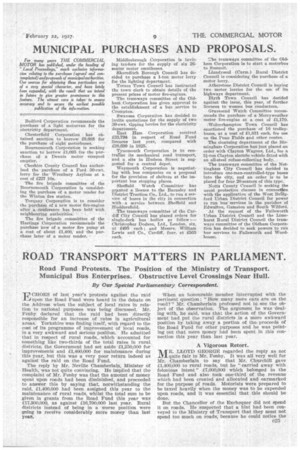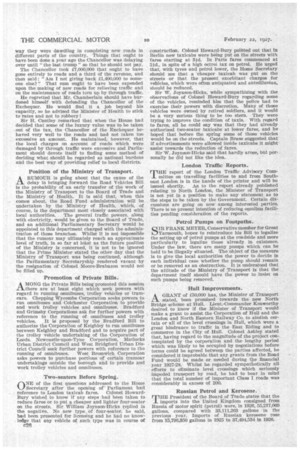ROAD TRANSPORT MATTERS IN PARLIAMENT.
Page 47

Page 48

If you've noticed an error in this article please click here to report it so we can fix it.
Road Fund Protests. The Position of the Ministry of Transport. Municipal Bus Enterprises. Obstructive Level Crossings Near Hull.
By Our Sped& Parliamentary Correspondent.
yjCHOES of last year's protests against the raid 1' upon the Road Fund were heard in the debate on the Address when the subject of local rates in relation to national purposes was being discussed. Mr. Fenhy declared that the raid had been ,directly responsible for an increase of rates in agricultural areas. Yorkshire was finding itself, with regard to the cost of its programme Of improvement of local roads, in a very awkward and serious position. He admitted that in respect of rural roads, which accounted for something like two-thirds of the total rates in rural districts, the Government had set aside 11,250,000 for improvements and £1,400,000 for maintenance during this year, but this was a very poor return indeed as against the raid on the Road Fund.
The reply by Mr. Neville Chamberlain, Minister of Health, was not quite convincing. He implied that the complaint of Mr. Feuby was that the amount of money spent upon roads had been diminished, and proceeded to answer this by saying that, notwithstanding the raid, £1,400,000 had been assigned this year to the maintenance of rural roads, whilst the total sum to be given in grants from the Road Fund this year was £17,300,000, as against £16,700,000 last year, Rural districts instead of being in a worse position were going to receive considerably more money than last year. When an honourable member interrupted with the pertinent question: " How many more ears are on the road?" Mr. Chamberlain professed not to see the object of the observation. The argument he was dealing with, he said, was that the action of the Government had put the rural districts in a more awkward position by taking away a portion of the proceeds of the Road Fund for other purposes and he was pointing out that more money had been spent in this connection this year than last year.
A Vigorous Retort.
Mquite fair toGErORFGenEhyregIatrdweadsthalel vrearpylywaA not Mr. Chamberlain to say that Mr. Churchill gave £1,400,000 to rural roads, but he "carried away with felonious intent" £7,000,000 which belonged to the Road Fund and also took one-third of the revenue Which had been created and allocated and earmarked for the purpose ,of roads. Motorists were prepared to be taxed heavily when the money was to be expended upon roads, and it was essential that this should be done.
But the Chancellor of the Exchequer did not spend it on roads. He suspected that a hint had been conveyed to the Ministry of Transport that they must not spend too much on roads, because he could notice the way they were dawdling in completing new roads in different parts of the country. Things that ought to have been done a year ago the Chancellor was delaying over until "the last trump" so that he should not pay.
The Chancellor took £7,000,000 that ought to have gone entirely to roads and a third of the revenue, and then said : "Am I not giving back £1,400,000 to someone else?" That sum ought to have been expended upon the making of new roads for relieving traffic and on the maintenance of roads torn up by through traffic. He regretted that Mr. Chamberlain should have burdened himself with defending the Chancellor of the Exchequer. He would find it a job beyond his capacity, so he advised the Minister of Health to stick to rates and not to robbery!
Sir H. Cantley remarked that when the House had decided that some of the luxury value was to be taken out of the tax, the Chancellor of the Exchequer behaved very well to the roads and had not taken too excessive an amount. He maintained, however, that the local charges on account of roads which were damaged by through traffic were excessive and Parliament should devote itself to finding some method of deciding what should be regarded as national burdens and the best way of providing relief to local districts.
Position of the Ministry of Transport.
ARUMOUR is going about that the cause of the delay In bringing forward the Road Vehicles Bill is the probability of an early transfer of the work of the Ministry of Transport to the Board of Trade and the Ministry of Health. It is said that, when this comes about, the Road Fund administration will be undertaken by the Ministry of Efealth, which, of course, is the department most closely associated with
local authorities. The general traffic powers, along with electricity, would be given to the Board of Trade, and an additional Parliamentary Secretary would be appointed to this department charged with the administration ofthose branches. Whilst it is not impossible that the rumour may ultimately reach an approximate level of truth, in so far at least as the future position of the Ministry is concerned, it is not to be ignored that the Prime Minister stated the other day that the Ministry of Transport was being continued, although the Parliamentary Secretaryship rendered vacant by the resignation of Colonel Moore-Brabazon would not be filled up.
Promotion of Private Bills.
AMONG the Private Bills being promoted this session there are at least eight which seek powers with regard to running omnibuses, trolley vehicles or tramcars. Chepping Wycombe Corporation seeks powers to run omnibuses and Colchester Corporation to provide and work trolley vehicles and omnibuses. Bradford and Grimsby Corporations ask for further powers with reference to the running of omnibuses and trolley vehicles. It is proposed by the Bradford Bill to authorize the Corporation of Keighley to run omnibuses between Keighley and Bradford and to acquire part of the trolley vehicle undertaking of the Corporation of Leeds. Newcastle-upon-Tyne Corporation, Matlocks Urban District Council and West Bridgford Urban District Council seek further powers with reference to the running of omnibuses. West Bromwich Corporation asks powers to purchase portions of certain tramcar undertakings outside the borough and to provide and work trolley vehicles and omnibuses.
Two-seaters Before Spring.
OYE of the first questions addressed to the Home Secretary after the opening of Parliament had reference to London taxicab fares. Colonel HowardBury wished to know if any steps had been taken to reduce fares or to put a cheaper and lighter four-seater on the streets. Sir. William Joynson-Hicks replied in the negative. No new type of four-seater, he said, had been presented for licensing and he had no knowledge that any vehicle of such type was in course of construction. Colonel Howard-Bury pointed out that in Berlin new taxicabs were being put on the streets with fares starting at 31d. In Paris fares commenced at 21d., in spite of a high octroi tar on petrol. He urged that, with tyres and petrol lower, the Home Secretary should see that a cheaper taxicab was put on the streets or that the present exorbitant charges for vehicles, which were often antiquated and antediluvian, should be reduced.
Sir W. Joynson-Hicks, while sympathizing with the observations of Colonel Howard-Bury regarding some of the vehicles, reminded him that the police had to exercise their powers with discretion. Many of the vehicles were owned by retired soldiers, and it would be a very serious thing to be too stern. They were trying to improve the condition of taxis. With regard to fares, all he could say was that they had already authorized two-seater taxicabs at lower fares, and he hoped that before the spring some of those vehicles would be on the streets. Captain Brass suggested that if advertisements were allowed inside taxicabs it might assist towards the reduction of fares.
Sir'W. Joynson-Hicks said that hardly arose, but personally he did not like the idea.
London Traffic Reports.
MHE report of the London Traffic Advisory Com
mittee on travelling facilities to and from Southeast London is in the hands of the printer and will be issued shortly. As to the report already published relating to North London, the Minister of Transport is not yet in a position to make any statement as to the steps to be taken by the Government. Certain discussions are going on now among interested parties. There is no present intention of reducing omnibus facilities pending consideration of the reports.
Petrol Pumps on Footpaths.
SIR FRANK MEYER, Conservative member for Great Yarmouth, hopes to reintroduce his Bill to legalize the setting up of petrol pumps at the roadside and more particularly to legalize those already in existence. Under the law, there are many pumps which can be held to be illegally situated. The object of the measure is to give the local authorities the power to decide in each individual case whether the pump should remain or be removed as an obstruction. It is understood that the attitude of the Ministry of Transport is that the department itself should have the power to insist on such pumps being removed.
Hull Improvements.
A GRANT of £50,000 has, the Minister of Transport Ile stated, been promised towards the new North Bridge scheme at Hull. Lieut.-Commander Kenvvorthy desired to know if the Minister of Transport would make a grant to assist the Corporation of Hull and the London and North Eastern Railway Co. to abolish certain or all of the level crossings in Hull, which were a great hindrance to traffic in the East Riding and to commerce in the City of Hull. Colonel Ashley, stated that, having regard to the magnitude of the project contemplated by the corporation and the lengthy period which was likely to be occupied by negotiations before terms could be agreed between the parties affected, he considered it improbable that any grants from the Road Fund would be made or needed during the financial year 1927-28. Whilst he regarded sympathetically all efforts to eliminate level crossings which seriously impeded transport by road, he had to bear in mind that the total number of important Class I roads was considerably in excess of 200.
Russian Petrol and Kerosene.
MHE President of the Board of Trade states that the
imports into the United Kingdom consigned from Russia of motor spirit (petrol) were, in 1926,_55,217,069 gallons, compared with 33,111,263 gallons in the previous year. Imports of Russian kerosene rose from 15,796,350 gallons in 1925 to 37,494,534 in 1926.












































































































